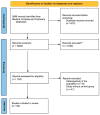A Systematic Review of Treatments of Post-Concussion Symptoms
- PMID: 36294545
- PMCID: PMC9604759
- DOI: 10.3390/jcm11206224
A Systematic Review of Treatments of Post-Concussion Symptoms
Abstract
Approximately 10−20% of patients who have sustained a mild Traumatic Brain Injury (mTBI) show persistent post-concussion symptoms (PCS). This review aims to summarize the level of evidence concerning interventions for PCS. Following the PRISMA guidelines, we conducted a systematic review regarding interventions for PCS post-mTBI until August 2021 using the Medline, Cochrane, and Embase databases. Inclusion criteria were the following: (1) intervention focusing on PCS after mTBI, (2) presence of a control group, and (3) adult patients (≥18 y.o). Quality assessment was determined using the Incog recommendation level, and the risk of bias was assessed using the revised Cochrane risk-of-bias tool. We first selected 104 full-text articles. Finally, 55 studies were retained, including 35 that obtained the highest level of evidence. The risk of bias was high in 22 out of 55 studies. Cognitive training, psycho-education, cognitive behavioral therapy, and graded return to physical activity demonstrated some effectiveness on persistent PCS. However, there is limited evidence of the beneficial effect of Methylphenidate. Oculomotor rehabilitation, light therapy, and headache management using repetitive transcranial magnetic stimulation seem effective regarding somatic complaints and sleep disorders. The preventive effect of early (<3 months) interventions remains up for debate. Despite its limitations, the results of the present review should encourage clinicians to propose a tailored treatment to patients according to the type and severity of PCS and could encourage further research with larger groups.
Keywords: cognition; mTBI; physical; post-concussion; psychological care; rehabilitation.
Conflict of interest statement
The authors declare no conflict of interest.
Figures





References
-
- Maas A.I.R., Menon D.K., Adelson P.D., Andelic N., Bell M.J., Belli A., Bragge P., Brazinova A., Büki A., Chesnut R.M., et al. Traumatic brain injury: Integrated approaches to improve prevention, clinical care, and research. Lancet Neurol. 2017;16:987–1048. doi: 10.1016/S1474-4422(17)30371-X. - DOI - PubMed
-
- Carroll L.J., Cassidy J.D., Holm L., Kraus J., Coronado V.G., WHO Collaborating Centre Task Force on Mild Traumatic Brain Injury Methodological issues and research recommendations for mild traumatic brain injury: The WHO Collaborating Centre Task Force on Mild Traumatic Brain Injury. J. Rehabil. Med. 2004;36:113–125. doi: 10.1080/16501960410023877. - DOI - PubMed
-
- World Health Organization . The ICD-10 Classification of Mental and Behavioural Disorders: Clinical Descriptions and Diagnostic Guidelines. World Health Organization; Geneva, Switzerland: 1992.
Publication types
LinkOut - more resources
Full Text Sources

